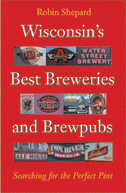|
Perfection
in a pint: Robin Shepard talks about his quest for beer in Wisconsin,
and craft beer trends
"Beer,
especially finding the perfect pint, is a hobby. I enjoy beer as a
beverage, but also the beer culture of seeing new places, meeting
interesting people, and sharing thoughts and impressions of beer with
friends.
What really transformed me from just a beer drinker to a beer enthusiast
was learning more about the small regional and local breweries of
Wisconsin.
It
started with the simple desire for a good local beer, then
moved into understanding what I like in a beer ... That introduced
me to the local "cultural" aspect of not just the
beer, but the towns and taverns in which you find it.
Sometimes,
it's like a scavenger hunt, finding great beer in the right atmosphere
and with the right people is what makes it special.
About four years ago, my quest for local beer ended up in the development
of a substantial computer database, something like my "life beer list."
My general inquisitive nature allowed me to feel comfortable talking
with brewers and brewpub owners. After awhile, I became an unofficial
tour guide
for friends who were looking for good food and great beer.
Those
friends encouraged me to write the book, Wisconsin's Best Breweries
and Brewpubs (University of Wisconsin Press)- so you could say I had
fun, and thoroughly enjoyed putting it together, but the book is for
them!
Wisconsin is special because we have both the very small and the very
large breweries. There are more than 60 breweries (including brewpubs)
in the state, ranging from Miller Brewing Company in Milwaukee that
produces millions of barrels of beer per year to the small Sand Creek
Brewery near Downing that turns about 100 barrels a year from a garage
on a 100 year old dairy farm.
Of course, there's a relationship to our cultural heritage and the
state's wonderful natural resources. Wisconsin was settled by a significant
number of people who came from Germany and Eastern Europe, where beer
was an
important part of their lifestyle. Milwaukee in particular offered
this cultural heritage, and a growing population not only for labor
to brew beer, but to drink beer.
Wisconsin's
natural landscape also played an important part. The state had (and
still has) abundant clean water. In winter, the 19th century brewer
could harvest ice for beer storage and lagering, and during summer,
till productive soils for growing barley and hops.
Milwaukee
as a center for transportation provided access to the railroad and
shipping via the Great Lakes.
Another interesting footnote in the Wisconsin's brewing dominance
was the impact of the great Chicago fire of 1870. When Chicago was
destroyed, Milwaukee brewers moved
quickly to fill a void and established themselves in the Midwest.
In the 21st century, the craft beer industry seems to be stable. In
2000-01 more breweries and brewpubs were opening and/or expanding
than the number closing. However it's almost even, suggesting that
we're beginning to level off in numbers. The industry is a volatile
one, it has always been.
This
is especially true for the restaurant-focused brewpub business where
food is a very essential element of success. I think most brewpub
owners and managers will say that the food and service are the keys
keeping customers.
While
serving beer is an important part of the business, brewing its own
beer adds to the restaurant. For the brewpub operator, beer "brand"
loyalty it is not quite the same as brand loyalty for a major brewery
that bottles and kegs its beer for mass markets. "
-
Robin Shephard, December 2001
|